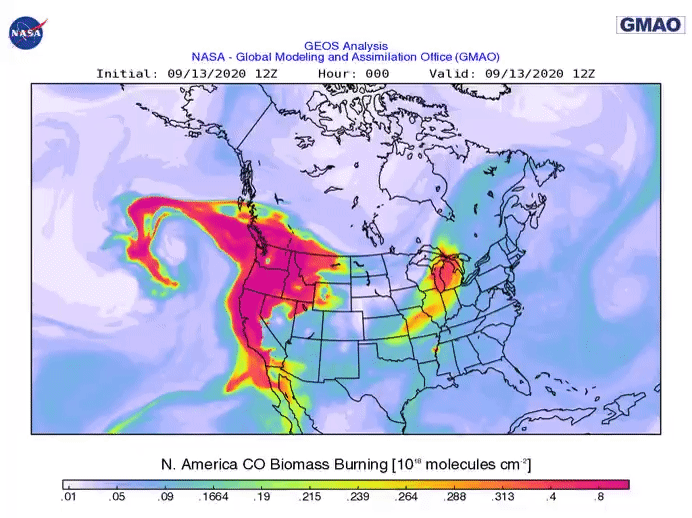Baby hurricanes, clean energy Republicans and the first climate SPAC
Welcome to Callaway Climate Insights and especially to our new subscribers. Please share, and if this was forwarded to you, please subscribe
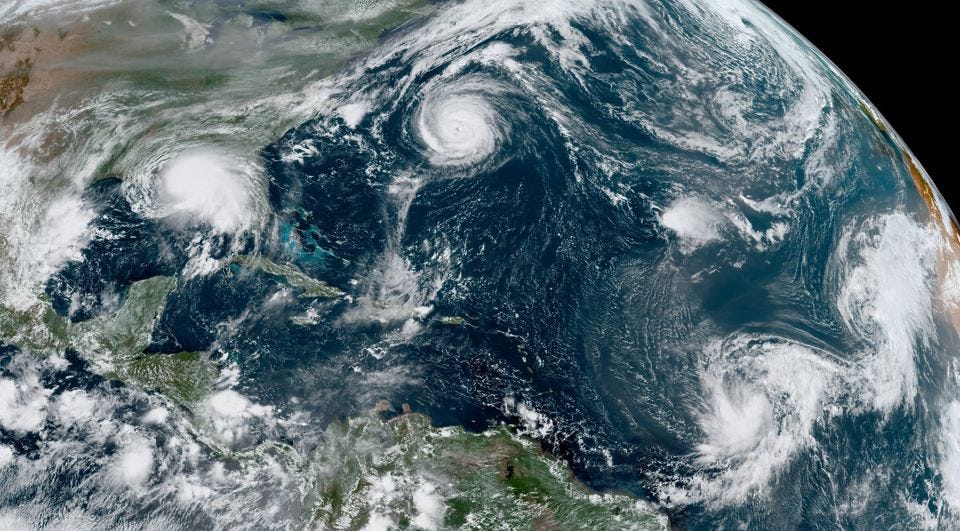
The National Hurricane Center late Monday said it was issuing advisories on five tropical cyclones over the Atlantic basin -- Paulette, Rene, Sally, Teddy and Vicky. That ties the 1971 record for the most tropical cyclones in that basin at one time, and they are running out of names for the 2020 season. Today, the NHC reported Sally is a hurricane, and expected to bring life-threatening storm surge and flooding through Wednesday along the northern Gulf Coast. Teddy was likely to become a hurricane later today or early tomorrow. Paulette was speeding up and Vicky was holding steady.
As the twin concepts of a “climate arsonist” and “more explosive trees” competed for attention in the U.S. election campaign’s climate change detour this week on the West Coast, a rare parade of baby hurricanes in the Atlantic reminded those out East that this is their climate change, too.
But while Joe Biden and California Democrats ratcheted up the pressure on President Donald Trump, who assured everyone that “it’ll start getting cooler, you just watch,” actual progress is being made this week on many fronts. As I wrote in my ZEUS column a few weeks ago, climate change as an election issue is well down the priority list, in part because most people already agree it’s important. In fact, Darrell Delamaide’s piece below highlights a couple dozen Republican candidates for the U.S. House and Senate this election season with climate chops, bucking the traditional party line.
So despite the theatrics of the campaigns and, well, the smoke and fire and wind and suffering, climate change is not contentious enough to top, say, law and order, taxes, or Covid-19 response as a political dividing line.
Instead, asset managers, tech companies, and sustainability executives prepared to honor “climate week” in New York City next week with a host of announcements and agreements that begin to show how the business community is taking matters into its own hands. Not the least of which was that Google (GOOGL) has bought enough carbon offsets to account for all of the carbonized energy it’s ever produced.
Now if it can just start producing it cleaner, as it and Apple (AAPL), have promised by 2030, we’ll see real progress. Until then, remember your mask helps keep the smoke out, too.
The Google story and other insights, below. . . .
And don’t forget to contact me directly if you have suggestions or ideas at dcallaway@callawayclimateinsights.com.
Republicans for climate solutions, coming to your ballot box this election
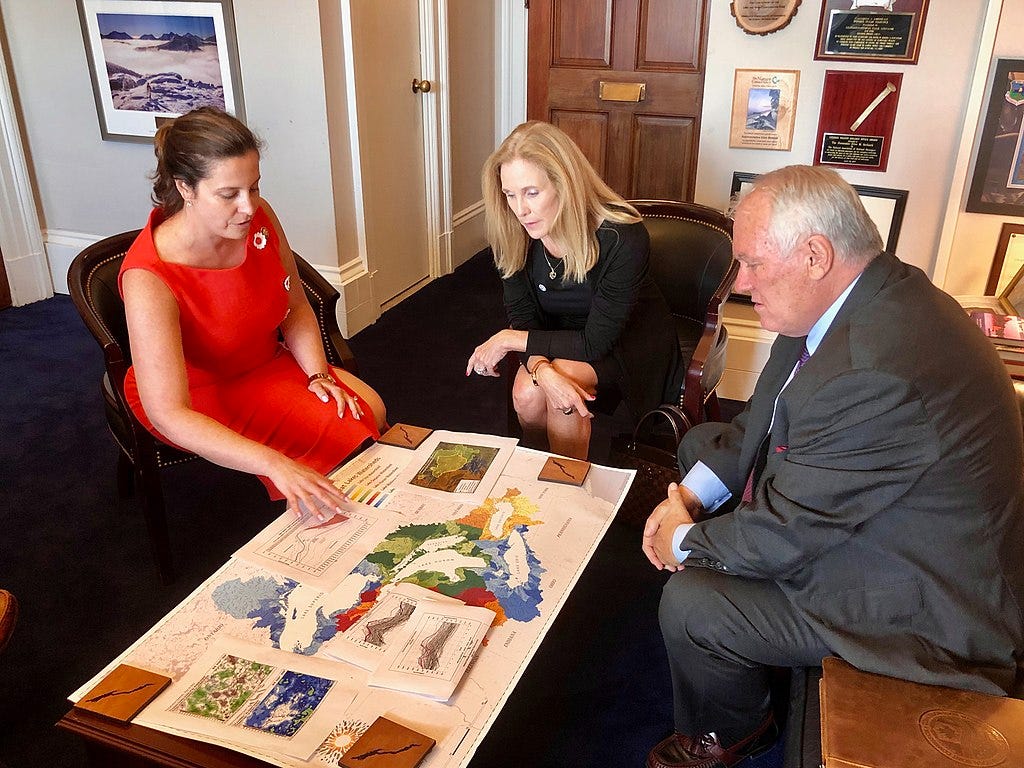
Rep. Elise Stefanik, 36, (R-NY) (left), meets with International Joint Commission representatives in 2019.
. . . . Almost two dozen Republican candidates for House and Senate seats this election have won the endorsement of the American Conservation Coalition for their climate solutions strategies. Darrell Delamaide looks at who they are and what they’re standing for as the movement by young Republicans begins to shift the dynamics of what had long been a simple party play.
The trench warfare that characterizes our politics prescribes that Democrats believe in the science of man-made climate change and Republicans do not, preferring to side with their supporters in fossil-fuel industries.
It’s not that simple. A new generation of Republican politicians is breaking the mold. Their approach to fighting climate change tends to be less dogmatic on how rapidly to phase out fossil fuels and is more like the all-of-the-above energy strategy favored by former President Barack Obama.

. . . . Round trip: Shares of Nikola Corp. (NKLA) were in the headlines for the fourth time in the seven trading days on Tuesday after the SEC waded into the fray between the electric truck company, the short seller and General Motors (GM). The outcome of this blowup is important because of its potential impact on investors in this growing space for electric vehicle companies, and indeed for many companies in the ESG universe.
As I wrote a few months ago in a column about the spate of deals involving these EV companies, it is wise to remember that many of them — such as Nikola — don't have any products yet. That Nikola admitted a promotional video of a truck driving was simply a shot of it coasting downhill will not help its case if and when it begins to build its Nikola Badger line (above).
Nikola shares got some relief after General Motors CEO Mary Barra came out in defense of its due diligence tied to taking an investment stake in Nikola last week, before short seller Hindenburg Research accused the company of fraud. But it lost those gains Tuesday on reports of SEC interest.
The fate of Nikola founder Trevor Milton will ride on how this comes out. For investors looking for the next Tesla (TSLA) to ESG managers trying to avoid accusations of “greenwashing” and otherwise over-promotional tactics, this is an early test of the resilience of the bet on green technologies. . . .
. . . . Caving in: The ousting of Australian mining giant Rio Tinto's chief executive and two other senior executives last week for the company’s blowing up of two indigenous artifact cave sites to get to iron ore was a game changer in the nascent field of shareholder climate activism. Time was, indeed, still is, when big fossil fuel companies could run roughshod over important sites without having to worry about their shareholders.
But the growing wad of ESG money — some $50 trillion worldwide — in the hands of some of the world’s most powerful institutions means those days are coming to an end. Indeed, the combination of the climate movement with the movement for racial justice this summer gives shareholders a powerful new weapon in the fight to rein in global fossil fuel expansion, as Jean-Sebastien Jacques found out.
The world’s biggest polluters should especially take heed of demands this week by more than 500 institutional investors that 161 companies, accounting for 80% of greenhouse gas omissions and including Rio Tinto, be held accountable if they don't back net-zero emissions strategies. With many of these institutions in places — like Australia and Silicon Valley — directly impacted by climate change right now, it’s hard to see this one fading anytime soon. . . .
. . . . Climate SPAC: Pimco, the institutional asset manager that has been an early leader in sustainability issues, and a group of investors announced late last week plans to set up their own special purpose acquisition company, or SPAC, to invest in climate change solutions. Climate Change Crisis Real Impact/Acquisition will raise $200 million in an initial public offering and will be listed on the New York Stock Exchange, according to regulatory filings. SPACS have been a favorite Wall Street tool this year to help emerging companies become listed, with several tied to electric vehicle companies such as Nikola. This is the first one tied exclusively to climate solutions investing and will be closely watched — by Callaway Climate Insights — for its early positions once it begins trading. . . .
. . . . New Post: Swiss wealth manager Lombard Odier and Oxford University announced what they claim is the first endowed senior academic post in sustainable finance, with a commitment by the bank to a multi-year collaboration that will involve using some of the academic research in its own investment products. Dr. Ben Caldecott of Oxford will be the first holder of the post. Both Oxford and Cambridge Universities have developed large sustainable research programs and lead a lot of Europe's groundbreaking work on sustainable finance.
Meanwhile, fellow Swiss banking giant UBS announced it will put sustainable investments at the core of its wealth management strategy for its private clients group. UBS, which said it manages some $488 billion in sustainable assets, said the global shift to this type of investing is just beginning. . . .
Data driven: C’mon, the water’s not fine
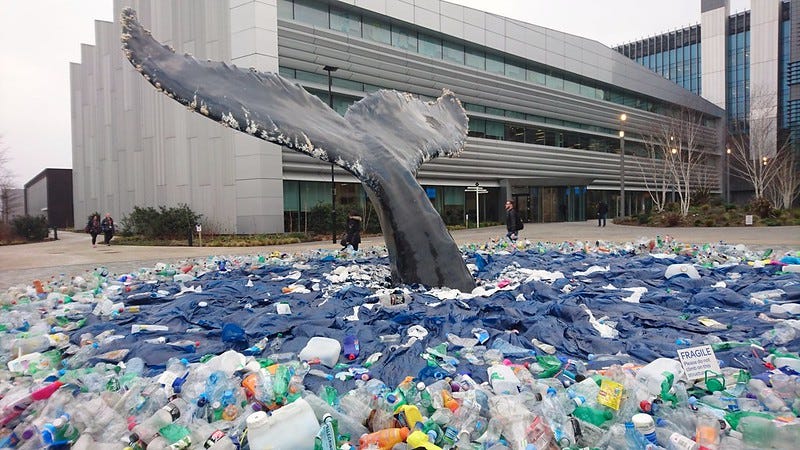
Above: Installation at Sky Central, London, depicting plastic pollution in the ocean. Photo: zoetnet/flickr.
. . . . Marine litter is a common threat in our oceans, and plastics form the major component of marine litter. Approximately 5.25 trillion plastic particles float on the ocean surface, weighing about 269,000 tons, with concentrations of up to 64 million particles per square kilometer in the Mediterranean Sea. Read more about plastic pollution in oceans from the UN Environment Programme. . . .
News briefs: BP says crude may never recover, Google aims for carbon-free data centers
Watch this: Do we have to choose between the economy and the climate?
Nobel Laureate Michael Kremer says that’s a false choice: With technological development, we can move toward a low carbon economy, promote innovation and drive economic growth.
Editor’s picks:
BP says peak oil is here, crude may never recover
Google offsets 22 years of carbon use, plans carbon-free data centers by 2030
New Zealand first in the world to require climate risk reporting
Latest findings: New research, studies and papers
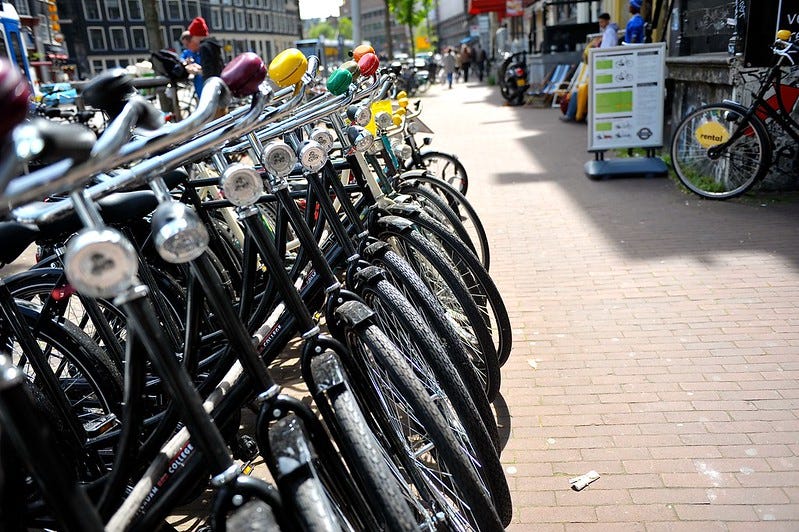
Above, black bikes for rent in Amsterdam. Photo: FaceMePLS/flickr.
Do Europeans care about climate change?
New research on how Europeans’ views climate change indicates that climate and the environment ranked only fifth in people's overall views about priorities and there also is skepticism that co-ordinated action, for example to cut personal energy use, would make much difference, according to a report from the University of Warwick on Phys.Org. Andrew Oswald, professor of economics and behavioral science at the University of Warwick, and senior author of the study titled “Do Europeans Care about Climate Change? An Illustration of the Importance of Data on Human Feelings,” is quoted in the report as saying, “It seems there is a chance the current generation will be content to sell their great grandchildren down the river.” Oswald and Adam Nowakowski of Bocconi University in Italy analyzed data from two large-scale sources, the 2016 European Social Survey and the 2019 Eurobarometer survey.
Energy innovations: clean and dirty technologies
From the abstract: The challenge of mitigating climate change has focused recent attention on basic scientific research feeding into the development of new energy technologies. …Results show that “clean” energy technologies are more dependent on underlying science than “dirty” technologies, and that the average lag between publication of scientific findings and the incorporation of those findings in clean energy patents has risen from about five to about eight years since the 1980s. These findings will help policymakers to devise more effective mechanisms and strategies for accelerating the overall rate of technological change in this domain.
Authors: Robert Perrons, Queensland University of Technology; Adam B. Jaffe, Motu Economic and Public Policy Research; Brandeis University; National Bureau of Economic Research; Trinh Le, Motu Economic and Public Policy Research Trust
NBER Working Paper No. w27777, available at SSRN.
International trade, climate change, investment
From the abstract: A transformative, integrated, and holistic approach to sustainability is necessary to reach a prosperous future for all. With growing inequality in the world, demographic change, rapid technological development, and 40% of the world’s population with no access to digital technology, access to digital technology for all and, ultimately, having a prosperous future is a must today. …Governments, companies, and transnational institutions should invest as much as possible to make it happen and provide solutions that are rules-based, inclusive, innovative, disruptive, and simple. …Access to energy, mitigating climate change, and benefiting from international trade and investment all can be achieved thanks to technological advancement. These global challenges are complex, interconnected, multidimensional, interdependent, and multi-causal.
Authors: Rafael Leal-Arcas, Queen Mary University of London School of Law; Samuel Balzano; Jakkrit Deethae; Tanvir Rai Singh; Kristina Skybova.
Queen Mary School of Law Legal Studies Research Paper No. 336/2020, Available at SSRN.



